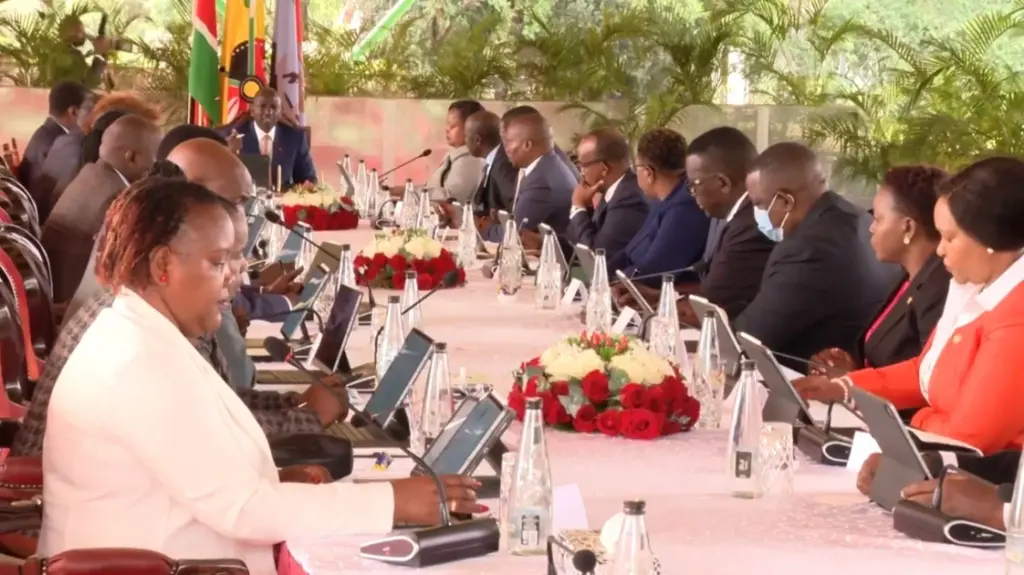Revolutionizing Finances: Cabinet Greenlights Unified Treasury System for National and County Governments
In a significant step towards improving the management of public finances, the Cabinet has given the green light for the adoption of the Treasury Single Account (TSA) for both national and county governments.
In a Monday cabinet session led by President William Ruto at State House Nairobi, the Cabinet emphasized the significance of the TSA in streamlining government banking, enhancing the visibility of government funds, and improving transparency in the management of government finances.
Furthermore, the updated system will contribute to managing expenses and reducing the dispersal of government funds across different accounts in commercial banks.
The TSA framework comprises the National Exchequer Account, the TSA Sub-Account, and the County Revenue Fund.
Addressing the issue, President Ruto stated, “Public funds are currently deposited in commercial bank accounts, generating interest for individuals. This practice needs to cease. The entirety of the advantages from public funds should exclusively benefit the people of Kenya and no one else.”
The Cabinet has given its approval for the adoption of Electronic Government Procurement (e-GP) in both the National and county governments.
The objective of this initiative is to improve fairness, equity, transparency, competitiveness, and cost efficiency in public procurement. It has the potential to decrease expenses by 10 to 15 percent, leading to an annual saving of Ksh.90 billion for the government in public procurement expenditures.
The e-GP system aims to advance the Bottom-Up Economic Transformation Agenda by fostering sustainable and inclusive economic development through the digitalization and automation of public procurement and asset disposal procedures.
The Cabinet’s choice to adopt electronic procurement is based on the recognition that embracing digital transformation is crucial for ensuring transparency, accountability, and the creation of an open marketplace for procurement agencies.
Government, suppliers, and the public stand to gain from electronic procurement as it facilitates a transparent flow of information regarding expenditures.
Approved in today’s Cabinet meeting are the Public-Private Partnership Regulations, designed to enhance the organization and effectiveness of PPP projects. This decision is vital for establishing a secure framework for both public and private entities engaged in PPPs, fostering a strong foundation for investment.
ALSO READ:
- Inside Job Exposed: Kenyan Prison Wardens Convicted for Orchestrating Daring Terrorist Escape
- Uganda Pulls the Plug: Nationwide Internet Blackout Ordered Days Before Crucial General Election
- African Elections Under the Spotlight as Zambia Turns to Kenya Ahead of 2026 Vote
- “Two Drug Barons in Cabinet?” Kenya Government Fires Back as Ex-Deputy President Sparks Explosive Drug Claims
- Kenyan Court Freezes Use of Private Lawyers by Government, Sparks Nationwide Legal Storm
The guidelines outlined in the regulations offer clear direction for the planning, procurement, management, and monitoring of PPP projects. These guidelines are by the Bottom-Up Economic Transformation agenda and integrate principles related to environmental conservation and climate change. The next step involves presenting the regulations to Parliament for approval.
To strengthen Kenya’s position as a central logistics hub in the region, the Cabinet has approved the Railway Amendment Bill 2024. This bill is designed to introduce innovative approaches to railway operations and to distinguish between the management of freight, commuter services, and land development.
Kenya Railways possesses extensive land holdings in the country, with a significant portion currently unused. The intention is to utilize this land for the creation of railway cities, similar to the ongoing development in Nairobi, with plans to expand to other prominent urban centers.
The proposed legislation suggests entrusting the management of these railway cities to the private sector, investors, and even county governments, with Kenya Railways transitioning into a regulatory role in such instances.
In response to the challenges posed by climate change, the Cabinet has endorsed Kenya’s Sovereign Green Bond Framework. This initiative aims to secure additional funding avenues for environmentally friendly and resilient investments in light of the increasing costs associated with climate change.
The Green Bond Framework serves as a financial tool designed to secure funds for climate action, establishing a connection between initiatives addressing climate issues and economic growth. The Cabinet acknowledges the capability of green bonds to generate funds for climate-resilient infrastructure, ensure food and water security, and facilitate the adoption of environmentally friendly technologies.
The Cabinet has given its approval to the 2023 Kenya Social Protection Policy draft, designed to provide support to the impoverished and vulnerable segments of society facing socio-economic difficulties. Aligned with constitutional responsibilities and national development objectives, this policy underscores the significance of social protection in alleviating poverty and promoting inclusive growth.
The Cabinet gave its endorsement to additional items such as the Recognition of Prior Learning Policy, the creation of the African Legal Support Facility, and the decision to participate in the Asian Infrastructure Investment Bank.
Revolutionizing Finances: Cabinet Greenlights Unified Treasury System for National and County Governments
